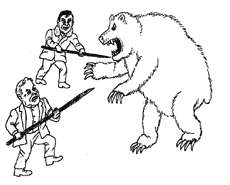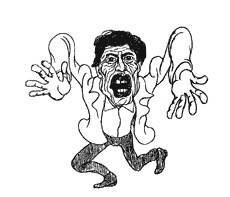Movies

The Edge (20th Century Fox). Most critics say David Mamet's trademark dialogue helps overcome the banal premise of his screenplay: A billionaire (Anthony Hopkins) and a fashion photographer (Alec Baldwin) who hate each other are stranded in the wilderness with a mean bear. The bear's performance is deemed a "milestone in ursine acting" (Kenneth Turan, the Los Angeles Times). The beauties of nature are also said to come to the film's assistance. Some complain about the swaggering Mametian machismo: He "has done little more than tone up a Men's Journal fantasy" (David Denby, New York). (Click here for the official site.)
The Peacemaker (DreamWorks SKG). Disappointed reviewers rate the Spielberg-Katzenberg-Geffen studio's debut just "a notch better than the average predictable action thriller" (Jay Carr, the Boston Globe). Stars George Clooney and Nicole Kidman are said to be perfectly likable but utterly humorless, and the nuclear-terrorism story line is called suspenseful but trite. "DreamWorks had a chance to do something different, instead they played it safe" (Anthony Lane, The New Yorker). (Clips are available here.)
Books
Big Trouble: A Murder in a Small Western Town Sets Off a Struggle for the Soul of America, by J. Anthony Lukas (Simon & Schuster). Acclaim for the former Times reporter's historical epic, completed just before his suicide in June. Reviewers praise the way Lukas made use of a historical incident--the assassination of an Idaho governor in 1905, allegedly by radical unionists--to examine the violent side of class warfare. Lukas' eclectic cast of characters (Clarence Darrow, E.H. Harriman, Teddy Roosevelt) rivals that of "some unwritten E.L. Doctorow novel" (David Remnick, The New Yorker). "This book is to 'true crime' stories what War and Peace is to most war novels" (Garry Wills, the New York Review of Books). The major complaint: too many digressions, inflating the book to 800-plus pages. (See Sean Wilentz's review in Slate.)
Timequake, by Kurt Vonnegut (Putnam). Muted objections to what the Slaughterhouse Five author has called his "last" work. Critics call the book--fragments from an uncompleted sci-fi novel about a 2001 "timequake" that forces people to relive the 1990s--"random" (Malcolm Bradbury, the London Times) and "misbegotten" (L.S. Klapp, Entertainment Weekly). But Vonnegut's very effort evokes a note of elegy. "[S]ince it comes from Vonnegut, America's favorite grumpy old man, you've got to love him" (Thomas Disch, the Washington Post).
Music

Time Out of Mind, by Bob Dylan (Columbia), and Bridges to Babylon, by the Rolling Stones (Virgin). The simultaneous release of albums from '60s rock stars occasions studies in contrast. Dylan's bluesy album wins accolades for introspective lyrics about mortality and is judged his best work in decades, "attesting to the creative renaissance of an artist still bent on defying expectations and spurning trends" (Edna Gundersen, USA Today). The Rolling Stones' new songs are called "uninspired retreads" (Richard Cromelin, the Los Angeles Times), and their much-hyped world tour--which uses giant nude inflatable dolls as set pieces--is pronounced "tasteless" (the Independent). (See the Stones' tour site.)
Television
ER: "Ambush" (NBC; Sept. 25). Some critics describe the top-rated drama's live broadcast as a welcome throwback to 1950s television. "A walk on a high wire ... thrilling to see it all come off so well," says the Washington Post's Tom Shales. But many also say the conceit of the episode--that a film crew is documenting life in an emergency room--was a cheap ploy to cover up gaffes. The New York Times' Caryn James says it undermined the whole episode, making "Ambush" "something the show has never been before and isn't likely to be again: terminally dull."
Art
"Sensations: Young British Artists From the Saatchi Collection" (Royal Academy of Art, London). Outrage greets the stodgy museum's exhibition of brash, hipster "Britpack" artists. London papers express outrage that the academy stamped its approval on works like Marcus Harvey's painting of a spread-legged naked woman and his portrait of a notorious child murderer, done in a mosaic of simulated children's handprints. "The Royal Academy of Porn," sneers the Daily Mail. American critics dismiss the controversy as old hat. The Britpack "represent the new orthodoxy," says the Wall Street Journal's Paul Levy.
Updates
In the Weekly Standard, Dinesh D'Souza rejects the Thernstroms' take on race as baselessly optimistic. "If there is a case for feeling good about the prospects of African Americans, the case is not effectively made here." ... Bucking the consensus on The Ice Storm, the New Republic's Stanley Kauffmann excoriates director Ang Lee: "[E]verything in his directing, absolutely everything, is banal."
Recent "Summary Judgment" columns
Book--The Royals, by Kitty Kelley;
Book--Underworld, by Don DeLillo;
Book--Great Apes, by Will Self;
Art--"Robert Rauschenberg: A Retrospective" (Guggenheim Museums and Ace Gallery, New York);
Movie--A Thousand Acres;
Movie--The Ice Storm;
Television--Veronica's Closet (NBC).
Movie--L.A. Confidential;
Movie--In & Out;
Television--Nothing Sacred (ABC);
Television--Brooklyn South (CBS);
Television--Michael Hayes (CBS);
Music--Candle in the Wind 1997, by Elton John;
Museum--Museum of Jewish Heritage: A Living Memorial to the Holocaust.
Television--Sister Wendy's Story of Painting (PBS);
Television--Ally McBeal (Fox);
Movie--She's So Lovely;
Movie--Sunday;
Book--The Farewell Symphony, by Edmund White;
Book--America in Black and White: One Nation, Indivisible, by Stephan and Abigail Thernstrom.
Movie--G.I. Jane;
Movie--Mimic;
Book--Already Dead: A California Gothic, by Denis Johnson;
Book--The One Best Way: Frederick Winslow Taylor and the Enigma of Efficiency, by Robert Kanigel;
Music--The Dance, by Fleetwood Mac;
Television--Good News (UPN).
--Compiled by Franklin Foer and the editors of Slate.
